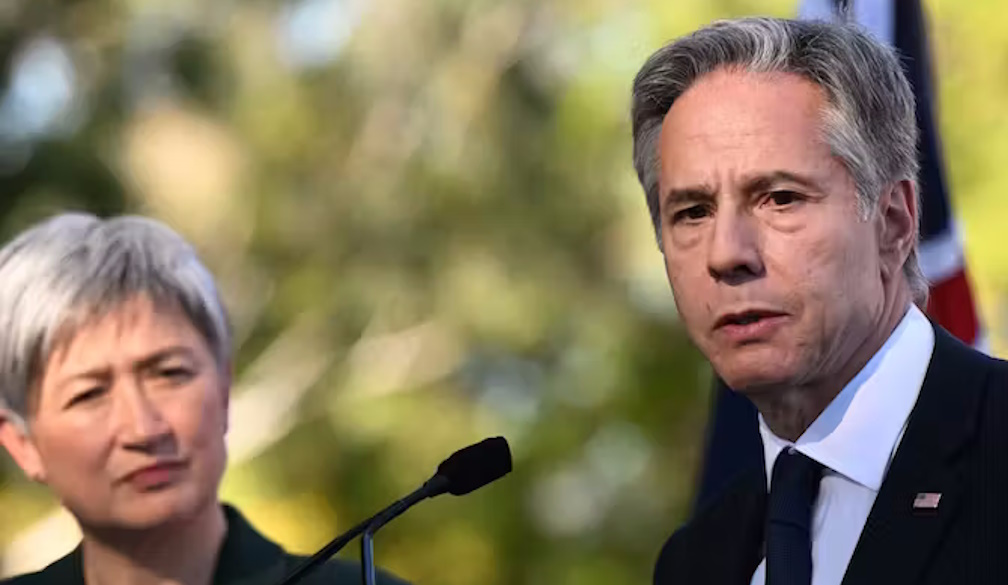WikiLeaks founder Julian Assange’s hopes of avoiding extradition to the United States, where he’s charged with espionage and computer misuse offences, have taken a blow.
US Secretary of State Anthony Blinken, asked on Saturday about the Australian government’s request that the US end the prosecution, said Assange had been “charged with very serious criminal conduct […] [which] risked very serious harm to our national security”.
He also asked that Australians see the US perspective on the case.
These statements will disappoint Assange’s supporters. Previously, the US hadn’t responded directly to the Australian government’s statements. The Albanese government has repeatedly said it believes the process for prosecuting Assange has gone on too long and should be brought to a conclusion.
From a diplomatic perspective, moving from silence or ambiguity to clearer opposition to the Australian government’s position suggests the US may have decided to prosecute Assange despite Australia’s objections.
However, Prime Minister Anthony Albanese said that position hadn’t changed, and that Secretary Blinken had merely said in public what had been said in private. He regards the diplomatic process as ongoing – though none can doubt it’s now more challenging.
How’d we get here?
The UK home secretary ordered Assange’s extradition to the US in 2022. Assange’s legal challenge to that order was rejected and is currently under appeal. In parallel, Assange has challenged the order before the European Court of Human Rights.
However, his best chance for freedom is for the US to withdraw the prosecution, or to pardon him.
Under former president Barack Obama, the US declined to prosecute Assange because his case could open the door to prosecution of journalists for espionage. The Trump administration issued an indictment against Assange in 2019, and the Biden administration has continued the extradition process.
Australians detained in foreign countries can access support at the nearest Australian embassy and have the right to communicate with Australian consular officials. At times Assange has rejected assistance, but he has had visits from Australian officials in the UK – including, unusually, High Commissioner Stephen Smith - this year.
The question is whether the US making its position on Assange public indicates it won’t shift that position, meaning further Australian discussions would be pointless.
Assange has enjoyed growing support from Australian parliamentarians. A group of MPs met with US Ambassador Caroline Kennedy in May this year.
But the uncompromising American position on pursuing prosecution is no surprise. The US has been resolute about prosecuting foreign nationals even when allies have objected.
In 1999, Germany took the US to the International Court of Justice because of its failure to grant German diplomats access to two German nationals accused of capital murder. Although the court found in Germany’s favour, the US still prosecuted and executed the brothers.
What if the government’s efforts fail?
Australia’s diplomatic efforts in other cases have produced successful outcomes. It has been effective recently in stopping the prosecution or extradition of persons under its protection. In 2022, Australian pressure led to the return of Professor Sean Turnell from Myanmar, where he had been charged with national security offences.
In 2019, direct engagement by then Foreign Minister Marise Payne with Thailand prevented the extradition of Hakeem Al-Araibi, a refugee and Australian permanent resident, to Bahrain.
Australia, working with the UK, secured the release of British-Australian academic Kylie Moore-Gilbert from Iran in November 2020. This was a more challenging diplomatic situation because of the less friendly relations between Iran and both the UK and Australia.
The US seems to resist Australian pressure more often than smaller states do. Assange’s supporters hoped a direct request by Australia, a close American ally, would lead to his release.
While the US has resisted Australia’s request, it hasn’t yet formally closed the door. Until Assange is extradited, it’s always possible Australia’s persuasion could yet succeed.
If it fails, Australia would have few options. It could apply symbolic diplomatic measures, such as calling in the American ambassador or bringing the Australian ambassador home from the US for consultations.
These acts would demonstrate concern, but they remain in the sphere of diplomacy.
Indeed protecting Australian nationals in foreign countries is less about the law than successful diplomatic practice.
While Albanese has said Australia will continue to make representations concerning Assange, the diplomatic road has become rockier.
This article first appeared in The Conversation and is republished with permission







